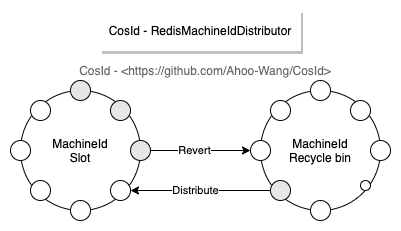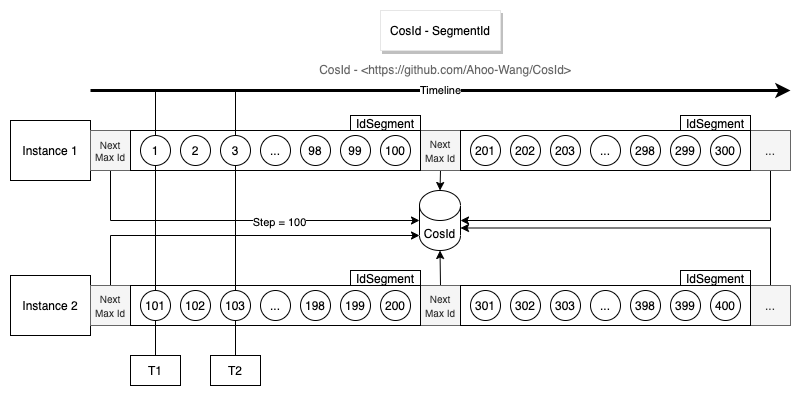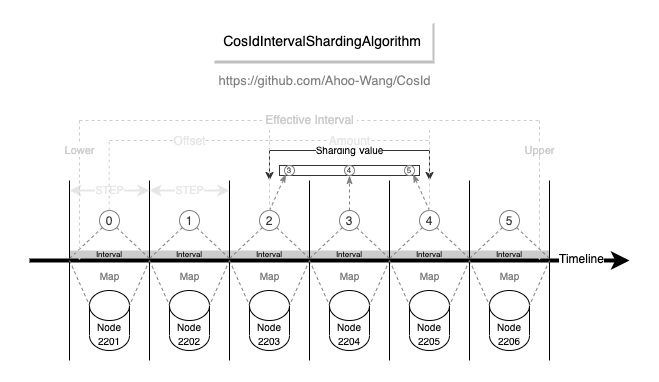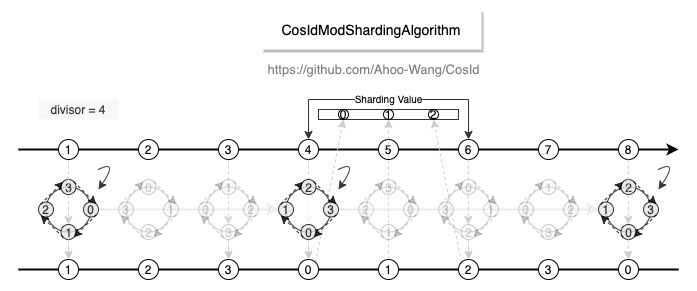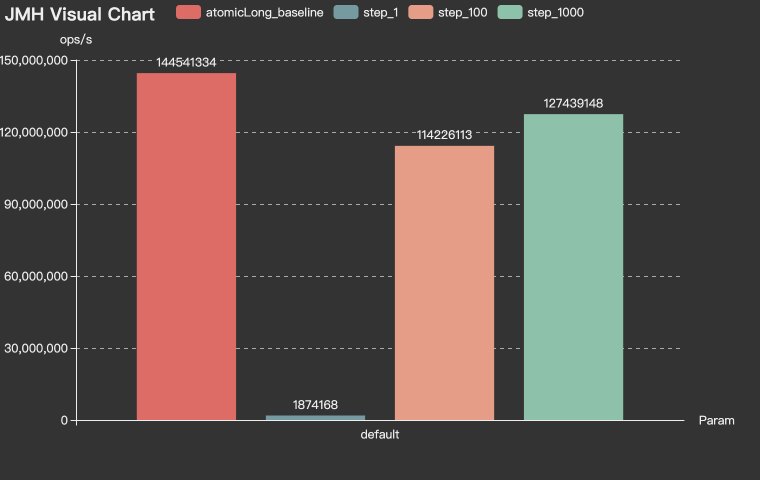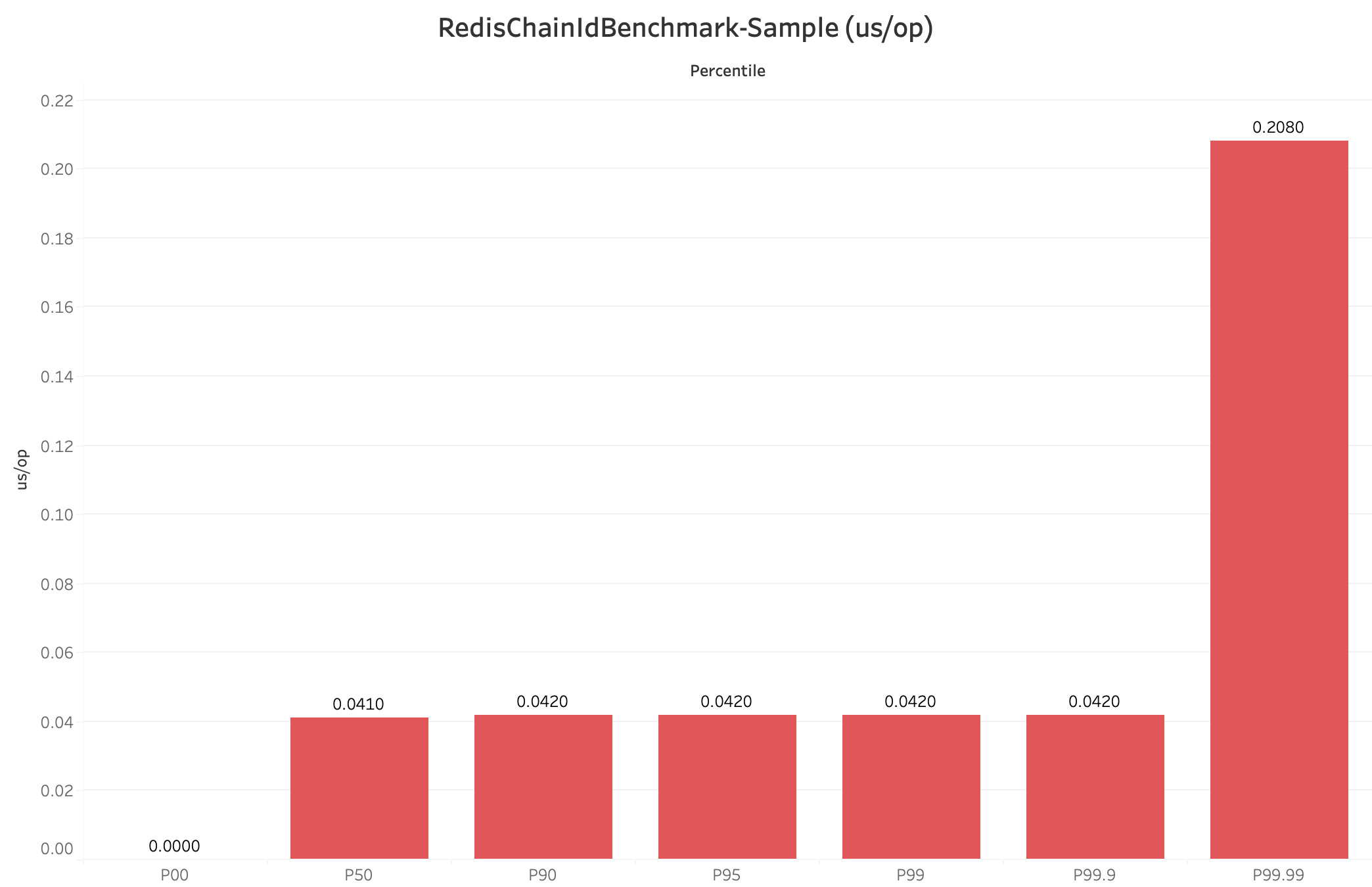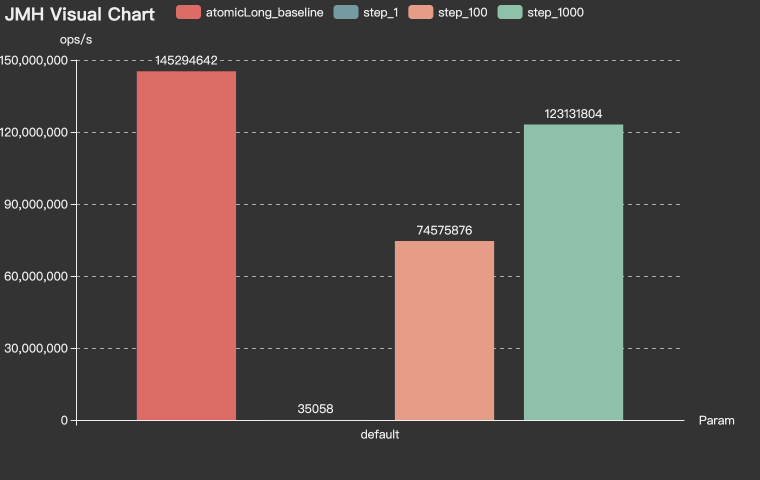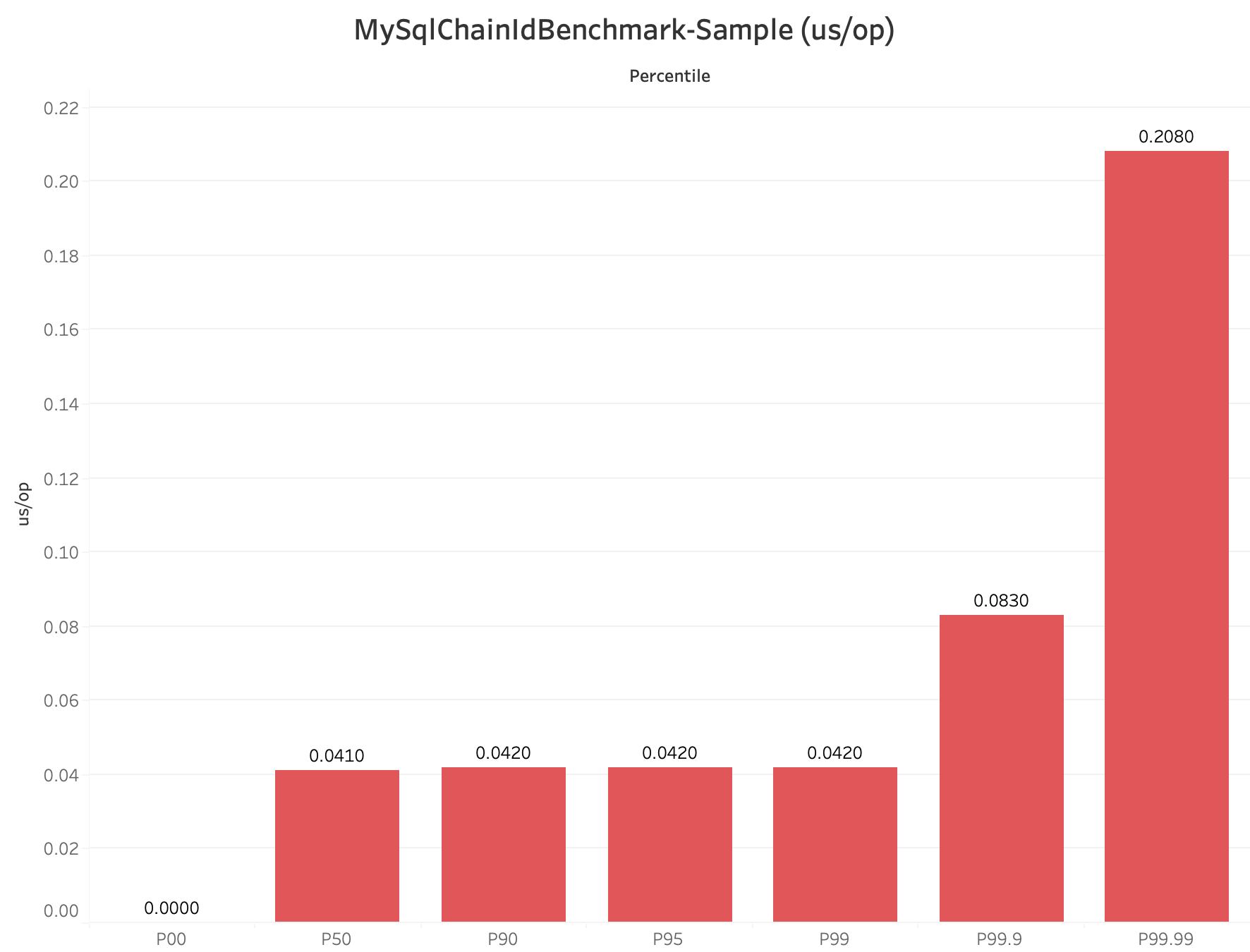CosId Universal, flexible, high-performance distributed ID generator
CosId aims to provide a universal, flexible and high-performance distributed ID generator. Two types of ID generators are currently provided:
SnowflakeId: Stand-alone TPS performance:4,096,000 JMH Benchmark , It mainly solves two major problems ofSnowflakeId: machine number allocation problem and clock backwards problem and provide a more friendly and flexible experience.SegmentId: Get a segment (Step) ID every time to reduce the network IO request frequency of theIdSegmentdistributor and improve performance.IdSegmentDistributor:RedisIdSegmentDistributor:IdSegmentdistributor based on Redis.JdbcIdSegmentDistributor: The Jdbc-basedIdSegmentdistributor supports various relational databases.
SegmentChainId(recommend):SegmentChainId(lock-free) is an enhancement ofSegmentId, the design diagram is as follows.PrefetchWorkermaintains asafe distance, so thatSegmentChainIdachieves approximatelyAtomicLongTPS performance (Step 1000): 127,439,148+/s JMH Benchmark .PrefetchWorkermaintains a safe distance (safeDistance), and supports dynamicsafeDistanceexpansion and contraction based on hunger status.
SnowflakeId is a distributed ID algorithm that uses
Long(64-bit) bit partition to generate ID. The general bit allocation scheme is :timestamp(41-bit) +machineId(10-bit) +sequence(12-bit) = 63-bit。
- 41-bit
timestamp= (1L<<41)/(1000/3600/365) approximately 69 years of timestamp can be stored, that is, the usable absolute time isEPOCH+ 69 years. Generally, we need to customizeEPOCHas the product development time. In addition, we can increase the number of allocated bits by compressing other areas, The number of timestamp bits to extend the available time. - 10-bit
machineId= (1L<<10) = 1024 That is, 1024 copies of the same business can be deployed (there is no master-slave copy in the Kubernetes concept, and the definition of Kubernetes is directly used here) instances. Generally, there is no need to use so many, so it will be redefined according to the scale of deployment. - 12-bit
sequence= (1L<<12) * 1000 = 4096000 That is, a single machine can generate about 409W ID per second, and a global same-service cluster can generate4096000*1024=4194304000=4.19 billion (TPS).
It can be seen from the design of SnowflakeId:
- 👍 The first 41-bit are a
timestamp,So SnowflakeId is local monotonically increasing, and affected by global clock synchronization SnowflakeId is global trend increasing. - 👍
SnowflakeIddoes not have a strong dependency on any third-party middleware, and its performance is also very high. - 👍 The bit allocation scheme can be flexibly configured according to the needs of the business system to achieve the optimal use effect.
- 👎 Strong reliance on the local clock, potential clock moved backwards problems will cause ID duplication.
- 👎 The
machineIdneeds to be set manually. If themachineIdis manually assigned during actual deployment, it will be very inefficient.
It mainly solves two major problems of SnowflakeId: machine number allocation problem and clock backwards problem and provide a more friendly and flexible experience.
Currently CosId provides the following three
MachineIddistributors.
cosid:
snowflake:
machine:
distributor:
type: manual
manual:
machine-id: 0Manually distribute
MachineId
cosid:
snowflake:
machine:
distributor:
type: stateful_setUse the stable identification ID provided by the
StatefulSetofKubernetesas the machine number.
cosid:
snowflake:
machine:
distributor:
type: redisUse Redis as the distribution store for the machine number.
cosid:
snowflake:
clock-backwards:
spin-threshold: 10
broken-threshold: 2000The default DefaultClockBackwardsSynchronizer clock moved backwards synchronizer uses active wait synchronization strategy, spinThreshold (default value 10 milliseconds) is used to set the spin wait threshold, when it is greater than spinThreshold, use thread sleep to wait for clock synchronization, if it exceeds BrokenThreshold (default value 2 seconds) will directly throw a ClockTooManyBackwardsException exception.
public class MachineState {
public static final MachineState NOT_FOUND = of(-1, -1);
private final int machineId;
private final long lastTimeStamp;
public MachineState(int machineId, long lastTimeStamp) {
this.machineId = machineId;
this.lastTimeStamp = lastTimeStamp;
}
public int getMachineId() {
return machineId;
}
public long getLastTimeStamp() {
return lastTimeStamp;
}
public static MachineState of(int machineId, long lastStamp) {
return new MachineState(machineId, lastStamp);
}
}cosid:
snowflake:
machine:
state-storage:
local:
state-location: ./cosid-machine-state/The default LocalMachineStateStorage local machine state storage uses a local file to store the machine number and the most recent timestamp, which is used as a MachineState cache.
cosid:
snowflake:
share:
clock-sync: trueThe default SnowflakeId will directly throw a ClockBackwardsException when a clock moved backwards occurs, while using the ClockSyncSnowflakeId will use the ClockBackwardsSynchronizer to actively wait for clock synchronization to regenerate the ID, providing a more user-friendly experience.
SnowflakeId snowflakeId = SafeJavaScriptSnowflakeId.ofMillisecond(1);The Number.MAX_SAFE_INTEGER of JavaScript has only 53-bit. If the 63-bit SnowflakeId is directly returned to the front end, the value will overflow. Usually we can convert SnowflakeId to String type or customize SnowflakeId Bit allocation is used to shorten the number of bits of SnowflakeId so that ID does not overflow when it is provided to the front end.
cosid:
snowflake:
share:
friendly: truepublic class SnowflakeIdState {
private final long id;
private final int machineId;
private final long sequence;
private final LocalDateTime timestamp;
/**
* {@link #timestamp}-{@link #machineId}-{@link #sequence}
*/
private final String friendlyId;
}public interface SnowflakeFriendlyId extends SnowflakeId {
SnowflakeIdState friendlyId(long id);
SnowflakeIdState ofFriendlyId(String friendlyId);
default SnowflakeIdState friendlyId() {
long id = generate();
return friendlyId(id);
}
} SnowflakeFriendlyId snowflakeFriendlyId=new DefaultSnowflakeFriendlyId(snowflakeId);
SnowflakeIdState idState = snowflakeFriendlyId.friendlyId();
idState.getFriendlyId(); //20210623131730192-1-0cosid:
segment:
enabled: true
distributor:
type: redisInitialize the
cosidtable
create table if not exists cosid
(
name varchar(100) not null comment '{namespace}.{name}',
last_max_id bigint not null default 0,
last_fetch_time bigint not null,
constraint cosid_pk
primary key (name)
) engine = InnoDB;spring:
datasource:
url: jdbc:mysql://localhost:3306/test_db
username: root
password: root
cosid:
segment:
enabled: true
distributor:
type: jdbc
jdbc:
enable-auto-init-cosid-table: false
enable-auto-init-id-segment: trueAfter enabling enable-auto-init-id-segment:true, the application will try to create the idSegment record when it starts to avoid manual creation. Similar to the execution of the following initialization sql script, there is no need to worry about misoperation, because name is the primary key.
insert into cosid
(name, last_max_id, last_fetch_time)
value
('namespace.name', 0, unix_timestamp());cosid:
segment:
enabled: true
mode: chain
chain:
safe-distance: 5
prefetch-worker:
core-pool-size: 2
prefetch-period: 1s
distributor:
type: redis
share:
offset: 0
step: 100
provider:
bizC:
offset: 10000
step: 100
bizD:
offset: 10000
step: 100cosid:
snowflake:
provider:
bizA:
# timestamp-bit:
sequence-bit: 12
bizB:
# timestamp-bit:
sequence-bit: 12IdGenerator idGenerator = idGeneratorProvider.get("bizA");In actual use, we generally do not use the same IdGenerator for all business services, but different businesses use different IdGenerator, then IdGeneratorProvider exists to solve this problem, and it is the container of IdGenerator , You can get the corresponding IdGenerator by the business name.
Kotlin DSL
implementation("me.ahoo.cosid:cosid-mybatis:${cosidVersion}")@Target({ElementType.FIELD})
@Documented
@Retention(RetentionPolicy.RUNTIME)
public @interface CosId {
String value() default IdGeneratorProvider.SHARE;
boolean friendlyId() default false;
}public class LongIdEntity {
@CosId(value = "safeJs")
private Long id;
public Long getId() {
return id;
}
public void setId(Long id) {
this.id = id;
}
}
public class FriendlyIdEntity {
@CosId(friendlyId = true)
private String id;
public String getId() {
return id;
}
public void setId(String id) {
this.id = id;
}
}@Mapper
public interface OrderRepository {
@Insert("insert into t_table (id) value (#{id});")
void insert(LongIdEntity order);
@Insert({
"<script>",
"insert into t_friendly_table (id)",
"VALUES" +
"<foreach item='item' collection='list' open='' separator=',' close=''>" +
"(#{item.id})" +
"</foreach>",
"</script>"})
void insertList(List<FriendlyIdEntity> list);
} LongIdEntity entity = new LongIdEntity();
entityRepository.insert(entity);
/**
* {
* "id": 208796080181248
* }
*/
return entity;Kotlin DSL
implementation("me.ahoo.cosid:cosid-shardingsphere:${cosidVersion}")spring:
shardingsphere:
rules:
sharding:
key-generators:
cosid:
type: COSID
props:
id-name: __share__- Ease of use: supports multiple data types (
Long/LocalDateTime/DATE/String/SnowflakeId),The official implementation is to first convert to a string and then convert toLocalDateTime, the conversion success rate is affected by the time formatting characters. - Performance: Compared to
org.apache.shardingsphere.sharding.algorithm.sharding.datetime.IntervalShardingAlgorithm,The performance is 1200~4000 times higher.
| PreciseShardingValue | RangeShardingValue |
|---|---|
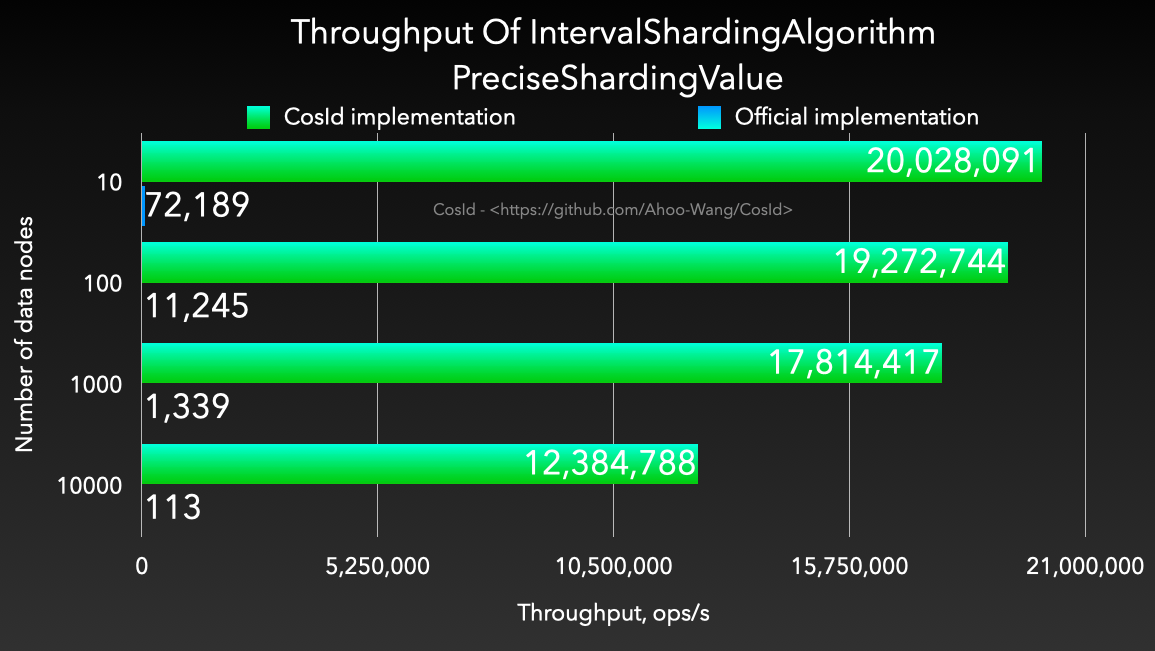 |
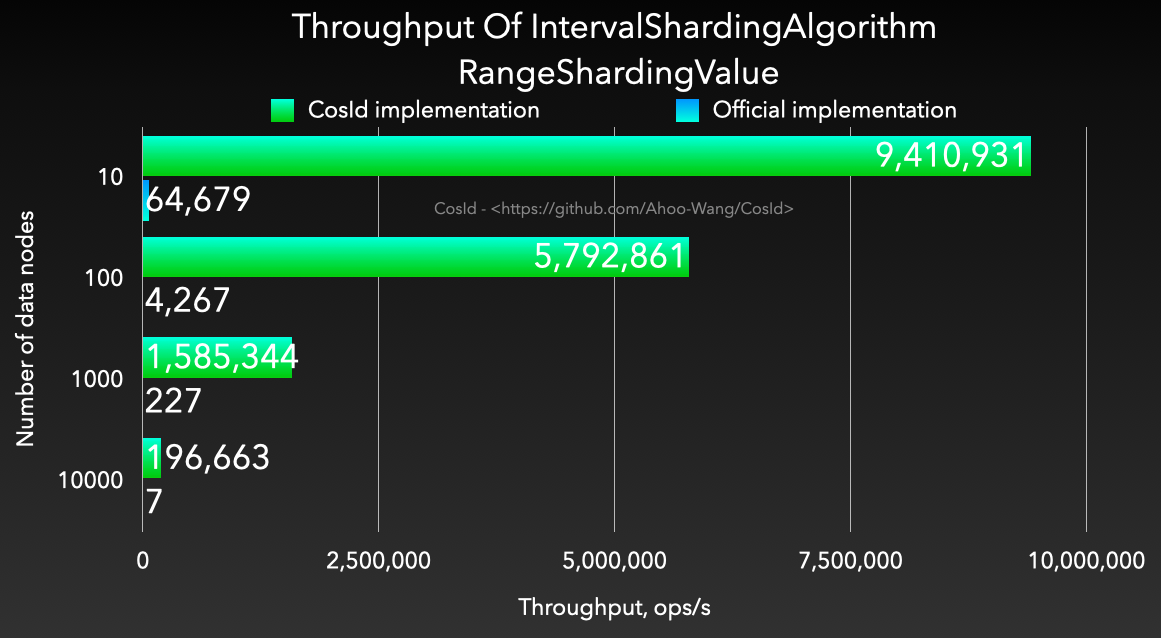 |
gradle cosid-shardingsphere:jmh# JMH version: 1.29
# VM version: JDK 11.0.13, OpenJDK 64-Bit Server VM, 11.0.13+8-LTS
# VM options: -Dfile.encoding=UTF-8 -Djava.io.tmpdir=/work/CosId/cosid-shardingsphere/build/tmp/jmh -Duser.country=CN -Duser.language=zh -Duser.variant
# Blackhole mode: full + dont-inline hint
# Warmup: 1 iterations, 10 s each
# Measurement: 1 iterations, 10 s each
# Timeout: 10 min per iteration
# Threads: 1 thread, will synchronize iterations
# Benchmark mode: Throughput, ops/time
Benchmark (days) Mode Cnt Score Error Units
IntervalShardingAlgorithmBenchmark.cosid_precise_local_date_time 10 thrpt 53279788.772 ops/s
IntervalShardingAlgorithmBenchmark.cosid_precise_local_date_time 100 thrpt 38114729.365 ops/s
IntervalShardingAlgorithmBenchmark.cosid_precise_local_date_time 1000 thrpt 32714318.129 ops/s
IntervalShardingAlgorithmBenchmark.cosid_precise_local_date_time 10000 thrpt 22317905.643 ops/s
IntervalShardingAlgorithmBenchmark.cosid_precise_timestamp 10 thrpt 20028091.211 ops/s
IntervalShardingAlgorithmBenchmark.cosid_precise_timestamp 100 thrpt 19272744.794 ops/s
IntervalShardingAlgorithmBenchmark.cosid_precise_timestamp 1000 thrpt 17814417.856 ops/s
IntervalShardingAlgorithmBenchmark.cosid_precise_timestamp 10000 thrpt 12384788.025 ops/s
IntervalShardingAlgorithmBenchmark.cosid_range_local_date_time 10 thrpt 18716732.080 ops/s
IntervalShardingAlgorithmBenchmark.cosid_range_local_date_time 100 thrpt 8436553.492 ops/s
IntervalShardingAlgorithmBenchmark.cosid_range_local_date_time 1000 thrpt 1655952.254 ops/s
IntervalShardingAlgorithmBenchmark.cosid_range_local_date_time 10000 thrpt 185348.831 ops/s
IntervalShardingAlgorithmBenchmark.cosid_range_timestamp 10 thrpt 9410931.643 ops/s
IntervalShardingAlgorithmBenchmark.cosid_range_timestamp 100 thrpt 5792861.181 ops/s
IntervalShardingAlgorithmBenchmark.cosid_range_timestamp 1000 thrpt 1585344.761 ops/s
IntervalShardingAlgorithmBenchmark.cosid_range_timestamp 10000 thrpt 196663.812 ops/s
IntervalShardingAlgorithmBenchmark.office_precise_timestamp 10 thrpt 72189.800 ops/s
IntervalShardingAlgorithmBenchmark.office_precise_timestamp 100 thrpt 11245.324 ops/s
IntervalShardingAlgorithmBenchmark.office_precise_timestamp 1000 thrpt 1339.128 ops/s
IntervalShardingAlgorithmBenchmark.office_precise_timestamp 10000 thrpt 113.396 ops/s
IntervalShardingAlgorithmBenchmark.office_range_timestamp 10 thrpt 64679.422 ops/s
IntervalShardingAlgorithmBenchmark.office_range_timestamp 100 thrpt 4267.860 ops/s
IntervalShardingAlgorithmBenchmark.office_range_timestamp 1000 thrpt 227.817 ops/s
IntervalShardingAlgorithmBenchmark.office_range_timestamp 10000 thrpt 7.579 ops/s
- SmartIntervalShardingAlgorithm
- type: COSID_INTERVAL
- DateIntervalShardingAlgorithm
- type: COSID_INTERVAL_DATE
- LocalDateTimeIntervalShardingAlgorithm
- type: COSID_INTERVAL_LDT
- StringIntervalShardingAlgorithm
- type: COSID_INTERVAL_STRING
- TimestampIntervalShardingAlgorithm
- type: COSID_INTERVAL_TS
- TimestampOfSecondIntervalShardingAlgorithm
- type: COSID_INTERVAL_TS_SECOND
- SnowflakeIntervalShardingAlgorithm
- type: COSID_INTERVAL_SNOWFLAKE
- SnowflakeFriendlyIntervalShardingAlgorithm
- type: COSID_INTERVAL_SNOWFLAKE_FRIENDLY
spring:
shardingsphere:
rules:
sharding:
sharding-algorithms:
alg-name:
type: COSID_INTERVAL_{type_suffix}
props:
logic-name-prefix: logic-name-prefix
id-name: cosid-name
datetime-lower: 2021-12-08 22:00:00
datetime-upper: 2022-12-01 00:00:00
sharding-suffix-pattern: yyyyMM
datetime-interval-unit: MONTHS
datetime-interval-amount: 1- Performance: Compared to
org.apache.shardingsphere.sharding.algorithm.sharding.datetime.IntervalShardingAlgorithm,The performance is 1200~4000 times higher.And it has higher stability and no serious performance degradation.
| PreciseShardingValue | RangeShardingValue |
|---|---|
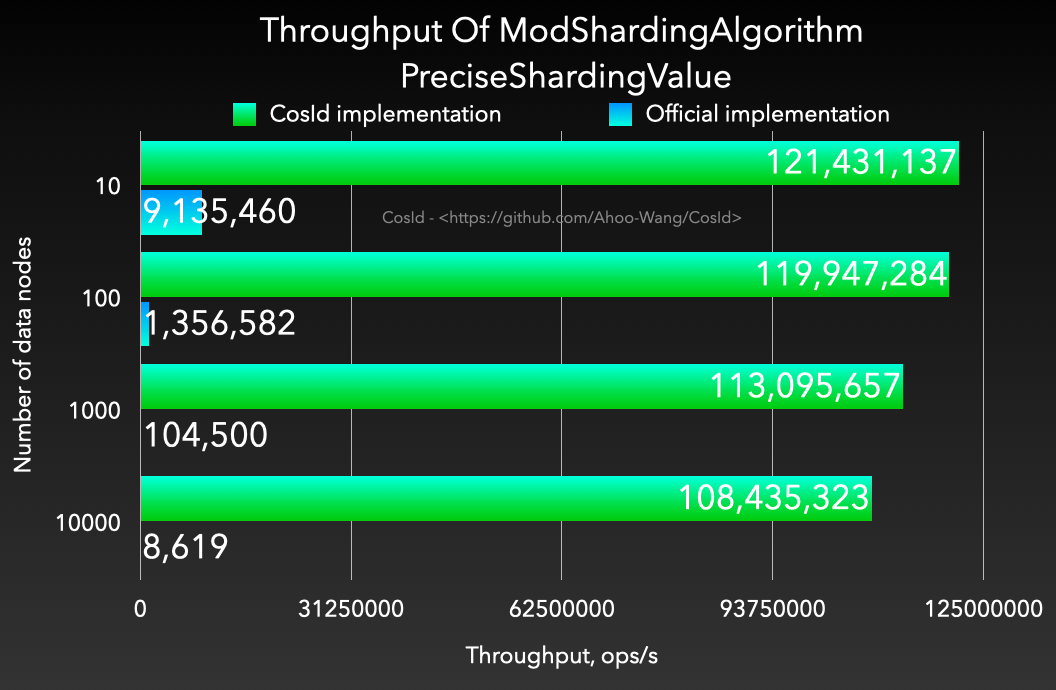 |
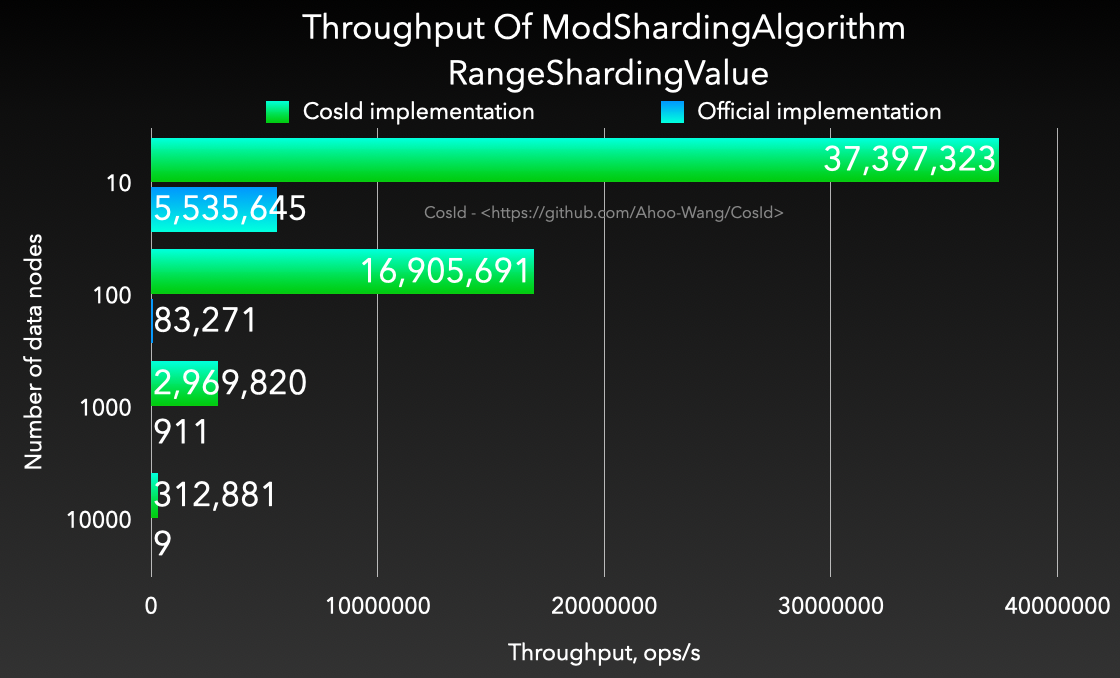 |
gradle cosid-shardingsphere:jmh# JMH version: 1.29
# VM version: JDK 11.0.13, OpenJDK 64-Bit Server VM, 11.0.13+8-LTS
# VM options: -Dfile.encoding=UTF-8 -Djava.io.tmpdir=/work/CosId/cosid-shardingsphere/build/tmp/jmh -Duser.country=CN -Duser.language=zh -Duser.variant
# Blackhole mode: full + dont-inline hint
# Warmup: 1 iterations, 10 s each
# Measurement: 1 iterations, 10 s each
# Timeout: 10 min per iteration
# Threads: 1 thread, will synchronize iterations
# Benchmark mode: Throughput, ops/time
Benchmark (divisor) Mode Cnt Score Error Units
ModShardingAlgorithmBenchmark.cosid_precise 10 thrpt 121431137.111 ops/s
ModShardingAlgorithmBenchmark.cosid_precise 100 thrpt 119947284.141 ops/s
ModShardingAlgorithmBenchmark.cosid_precise 1000 thrpt 113095657.321 ops/s
ModShardingAlgorithmBenchmark.cosid_precise 10000 thrpt 108435323.537 ops/s
ModShardingAlgorithmBenchmark.cosid_precise 100000 thrpt 84657505.579 ops/s
ModShardingAlgorithmBenchmark.cosid_range 10 thrpt 37397323.508 ops/s
ModShardingAlgorithmBenchmark.cosid_range 100 thrpt 16905691.783 ops/s
ModShardingAlgorithmBenchmark.cosid_range 1000 thrpt 2969820.981 ops/s
ModShardingAlgorithmBenchmark.cosid_range 10000 thrpt 312881.488 ops/s
ModShardingAlgorithmBenchmark.cosid_range 100000 thrpt 31581.396 ops/s
ModShardingAlgorithmBenchmark.office_precise 10 thrpt 9135460.160 ops/s
ModShardingAlgorithmBenchmark.office_precise 100 thrpt 1356582.418 ops/s
ModShardingAlgorithmBenchmark.office_precise 1000 thrpt 104500.125 ops/s
ModShardingAlgorithmBenchmark.office_precise 10000 thrpt 8619.933 ops/s
ModShardingAlgorithmBenchmark.office_precise 100000 thrpt 629.353 ops/s
ModShardingAlgorithmBenchmark.office_range 10 thrpt 5535645.737 ops/s
ModShardingAlgorithmBenchmark.office_range 100 thrpt 83271.925 ops/s
ModShardingAlgorithmBenchmark.office_range 1000 thrpt 911.534 ops/s
ModShardingAlgorithmBenchmark.office_range 10000 thrpt 9.133 ops/s
ModShardingAlgorithmBenchmark.office_range 100000 thrpt 0.208 ops/s
spring:
shardingsphere:
rules:
sharding:
sharding-algorithms:
alg-name:
type: COSID_MOD
props:
mod: 4
logic-name-prefix: t_table_Kotlin DSL
val cosidVersion = "1.5.1";
implementation("me.ahoo.cosid:cosid-spring-boot-starter:${cosidVersion}")<?xml version="1.0" encoding="UTF-8"?>
<project xmlns="http://maven.apache.org/POM/4.0.0"
xmlns:xsi="http://www.w3.org/2001/XMLSchema-instance"
xsi:schemaLocation="http://maven.apache.org/POM/4.0.0 http://maven.apache.org/xsd/maven-4.0.0.xsd">
<modelVersion>4.0.0</modelVersion>
<artifactId>demo</artifactId>
<properties>
<cosid.version>1.5.1</cosid.version>
</properties>
<dependencies>
<dependency>
<groupId>me.ahoo.cosid</groupId>
<artifactId>cosid-spring-boot-starter</artifactId>
<version>${cosid.version}</version>
</dependency>
</dependencies>
</project>spring:
shardingsphere:
datasource:
names: ds0,ds1
ds0:
type: com.zaxxer.hikari.HikariDataSource
driver-class-name: com.mysql.cj.jdbc.Driver
jdbcUrl: jdbc:mysql://localhost:3306/cosid_db_0
username: root
password: root
ds1:
type: com.zaxxer.hikari.HikariDataSource
driver-class-name: com.mysql.cj.jdbc.Driver
jdbcUrl: jdbc:mysql://localhost:3306/cosid_db_1
username: root
password: root
props:
sql-show: true
rules:
sharding:
binding-tables:
- t_order,t_order_item
tables:
cosid:
actual-data-nodes: ds0.cosid
t_table:
actual-data-nodes: ds0.t_table_$->{0..1}
table-strategy:
standard:
sharding-column: id
sharding-algorithm-name: table-inline
t_friendly_table:
actual-data-nodes: ds0.t_friendly_table
t_order:
actual-data-nodes: ds$->{0..1}.t_order
database-strategy:
standard:
sharding-column: order_id
sharding-algorithm-name: order-db-inline
key-generate-strategy:
column: order_id
key-generator-name: order
t_order_item:
actual-data-nodes: ds$->{0..1}.t_order_item
database-strategy:
standard:
sharding-column: order_id
sharding-algorithm-name: order-db-inline
t_date_log:
actual-data-nodes: ds0.t_date_log_202112
key-generate-strategy:
column: id
key-generator-name: snowflake
table-strategy:
standard:
sharding-column: create_time
sharding-algorithm-name: data-log-interval
t_date_time_log:
actual-data-nodes: ds0.t_date_time_log_202112
key-generate-strategy:
column: id
key-generator-name: snowflake
table-strategy:
standard:
sharding-column: create_time
sharding-algorithm-name: data-time-log-interval
t_timestamp_log:
actual-data-nodes: ds0.t_timestamp_log_202112
key-generate-strategy:
column: id
key-generator-name: snowflake
table-strategy:
standard:
sharding-column: create_time
sharding-algorithm-name: timestamp-log-interval
t_snowflake_log:
actual-data-nodes: ds0.t_snowflake_log_202112
table-strategy:
standard:
sharding-column: id
sharding-algorithm-name: snowflake-log-interval
sharding-algorithms:
table-inline:
type: COSID_MOD
props:
mod: 2
logic-name-prefix: t_table_
order-db-inline:
type: COSID_MOD
props:
mod: 2
logic-name-prefix: ds
data-log-interval:
type: COSID_INTERVAL_DATE
props:
logic-name-prefix: t_date_log_
datetime-lower: 2021-12-08 22:00:00
datetime-upper: 2022-12-01 00:00:00
sharding-suffix-pattern: yyyyMM
datetime-interval-unit: MONTHS
datetime-interval-amount: 1
data-time-log-interval:
type: COSID_INTERVAL_LDT
props:
logic-name-prefix: t_date_time_log_
datetime-lower: 2021-12-08 22:00:00
datetime-upper: 2022-12-01 00:00:00
sharding-suffix-pattern: yyyyMM
datetime-interval-unit: MONTHS
datetime-interval-amount: 1
timestamp-log-interval:
type: COSID_INTERVAL_TS
props:
logic-name-prefix: t_timestamp_log_
datetime-lower: 2021-12-08 22:00:00
datetime-upper: 2022-12-01 00:00:00
sharding-suffix-pattern: yyyyMM
datetime-interval-unit: MONTHS
datetime-interval-amount: 1
snowflake-log-interval:
type: COSID_INTERVAL_SNOWFLAKE
props:
logic-name-prefix: t_snowflake_log_
id-name: snowflake
datetime-lower: 2021-12-08 22:00:00
datetime-upper: 2022-12-01 00:00:00
sharding-suffix-pattern: yyyyMM
datetime-interval-unit: MONTHS
datetime-interval-amount: 1
key-generators:
snowflake:
type: COSID
props:
id-name: snowflake
order:
type: COSID
props:
id-name: order
cosid:
namespace: ${spring.application.name}
snowflake:
enabled: true
# epoch: 1577203200000
clock-backwards:
spin-threshold: 10
broken-threshold: 2000
machine:
# stable: true
# machine-bit: 10
# instance-id: ${HOSTNAME}
distributor:
type: redis
# manual:
# machine-id: 0
state-storage:
local:
state-location: ./cosid-machine-state/
share:
clock-sync: true
friendly: true
provider:
order_item:
# timestamp-bit:
sequence-bit: 12
snowflake:
sequence-bit: 12
safeJs:
machine-bit: 3
sequence-bit: 9
segment:
enabled: true
mode: chain
chain:
safe-distance: 5
prefetch-worker:
core-pool-size: 2
prefetch-period: 1s
distributor:
type: redis
share:
offset: 0
step: 100
provider:
order:
offset: 10000
step: 100
longId:
offset: 10000
step: 100- The development notebook : MacBook Pro (M1)
- All benchmark tests are carried out on the development notebook.
- Deploying Redis on the development notebook.
gradle cosid-core:jmh
# or
java -jar cosid-core/build/libs/cosid-core-1.5.1-jmh.jar -bm thrpt -wi 1 -rf json -f 1Benchmark Mode Cnt Score Error Units
SnowflakeIdBenchmark.millisecondSnowflakeId_friendlyId thrpt 4020311.665 ops/s
SnowflakeIdBenchmark.millisecondSnowflakeId_generate thrpt 4095403.859 ops/s
SnowflakeIdBenchmark.safeJsMillisecondSnowflakeId_generate thrpt 511654.048 ops/s
SnowflakeIdBenchmark.safeJsSecondSnowflakeId_generate thrpt 539818.563 ops/s
SnowflakeIdBenchmark.secondSnowflakeId_generate thrpt 4206843.941 ops/s
gradle cosid-redis:jmh
# or
java -jar cosid-redis/build/libs/cosid-redis-1.5.1-jmh.jar -bm thrpt -wi 1 -rf json -f 1 RedisChainIdBenchmarkBenchmark Mode Cnt Score Error Units
RedisChainIdBenchmark.atomicLong_baseline thrpt 5 144541334.198 ± 5578137.471 ops/s
RedisChainIdBenchmark.step_1 thrpt 5 1874168.687 ± 310274.706 ops/s
RedisChainIdBenchmark.step_100 thrpt 5 114226113.524 ± 15789563.078 ops/s
RedisChainIdBenchmark.step_1000 thrpt 5 127439148.104 ± 1833743.699 ops/s
In statistics, a percentile (or a centile) is a score below which a given percentage of scores in its frequency distribution falls (exclusive definition) or a score at or below which a given percentage falls (inclusive definition). For example, the 50th percentile (the median) is the score below which (exclusive) or at or below which (inclusive) 50% of the scores in the distribution may be found.
java -jar cosid-redis/build/libs/cosid-redis-1.5.1-jmh.jar -bm sample -wi 1 -rf json -f 1 -tu us step_1000Benchmark Mode Cnt Score Error Units
RedisChainIdBenchmark.step_1000 sample 1336271 0.024 ± 0.001 us/op
RedisChainIdBenchmark.step_1000:step_1000·p0.00 sample ≈ 0 us/op
RedisChainIdBenchmark.step_1000:step_1000·p0.50 sample 0.041 us/op
RedisChainIdBenchmark.step_1000:step_1000·p0.90 sample 0.042 us/op
RedisChainIdBenchmark.step_1000:step_1000·p0.95 sample 0.042 us/op
RedisChainIdBenchmark.step_1000:step_1000·p0.99 sample 0.042 us/op
RedisChainIdBenchmark.step_1000:step_1000·p0.999 sample 0.042 us/op
RedisChainIdBenchmark.step_1000:step_1000·p0.9999 sample 0.208 us/op
RedisChainIdBenchmark.step_1000:step_1000·p1.00 sample 37.440 us/op
gradle cosid-jdbc:jmh
# or
java -jar cosid-jdbc/build/libs/cosid-jdbc-1.5.1-jmh.jar -bm thrpt -wi 1 -rf json -f 1 MySqlChainIdBenchmarkBenchmark Mode Cnt Score Error Units
MySqlChainIdBenchmark.atomicLong_baseline thrpt 5 145294642.937 ± 224876.284 ops/s
MySqlChainIdBenchmark.step_1 thrpt 5 35058.790 ± 36226.041 ops/s
MySqlChainIdBenchmark.step_100 thrpt 5 74575876.804 ± 5590390.811 ops/s
MySqlChainIdBenchmark.step_1000 thrpt 5 123131804.260 ± 1488004.409 ops/s
java -jar cosid-jdbc/build/libs/cosid-jdbc-1.5.1-jmh.jar -bm sample -wi 1 -rf json -f 1 -tu us step_1000Benchmark Mode Cnt Score Error Units
MySqlChainIdBenchmark.step_1000 sample 1286774 0.024 ± 0.001 us/op
MySqlChainIdBenchmark.step_1000:step_1000·p0.00 sample ≈ 0 us/op
MySqlChainIdBenchmark.step_1000:step_1000·p0.50 sample 0.041 us/op
MySqlChainIdBenchmark.step_1000:step_1000·p0.90 sample 0.042 us/op
MySqlChainIdBenchmark.step_1000:step_1000·p0.95 sample 0.042 us/op
MySqlChainIdBenchmark.step_1000:step_1000·p0.99 sample 0.042 us/op
MySqlChainIdBenchmark.step_1000:step_1000·p0.999 sample 0.083 us/op
MySqlChainIdBenchmark.step_1000:step_1000·p0.9999 sample 0.208 us/op
MySqlChainIdBenchmark.step_1000:step_1000·p1.00 sample 342.528 us/op

